How to grow raspberries
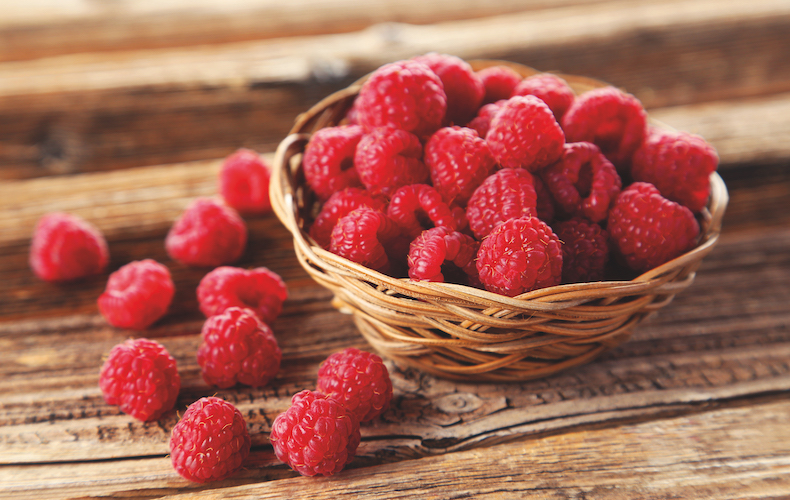
Read our guide for growing raspberries, packed with expert tips
Image: Raspberry 'Autumn Bliss' (Autumn fruiting) from Thompson & Morgan
A glut of succulent raspberries during the summer and autumn is a seasonal treat not to be missed. But why spend a fortune on supermarket punnets when you can easily grow your own delicious raspberries at home or on your allotment? Here’s your guide to cultivating this delicious summer fruit – all you need to know about how to plant & grow your own raspberry plants.
When should I plant my raspberries?
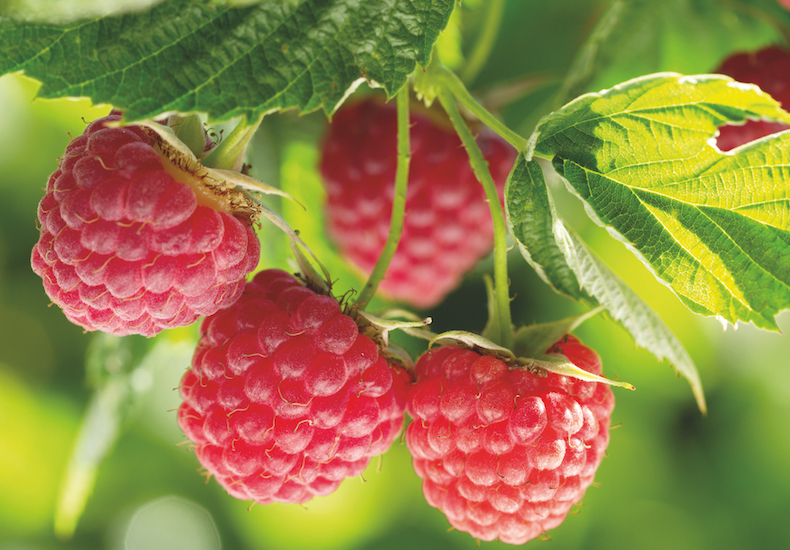
Raspberries fruit from June to October depending on the variety
Image: Raspberry 'Polka' (Autumn fruiting) from Thompson & Morgan
Plant dormant raspberry canes into well-manured soil, any time between November and March. Just make sure the soil isn’t frozen or waterlogged first.
Which variety of raspberry should I grow?
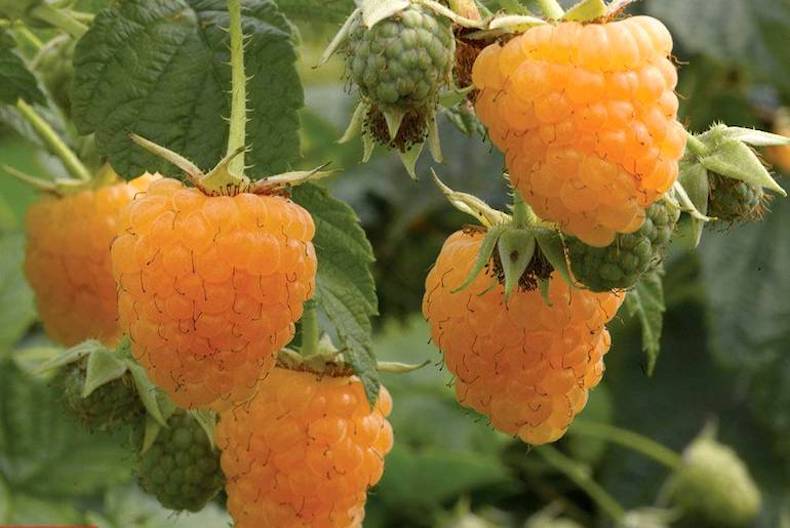
For autumn-fruiting raspberries, consider 'All Gold' yellow raspberries
Image: Raspberry 'All Gold' (Autumn fruiting) from Thompson & Morgan
- Summer-fruiting raspberries fruit between June and early August depending on the specific variety. For the earliest harvests, give 'Glen Ample' or delicious 'Glen Prosen' a try.
- Autumn-fruiting raspberries fruit between August and October. These varieties don’t need supporting, making them ideal for growing in containers on the patio, and because the process of pruning them is so simple, they’re also a good choice for beginners. Try reliable 'Autumn Treasure', or for something more unusual yellow raspberries like 'All Gold', are a good bet.
Primocanes or floricanes?
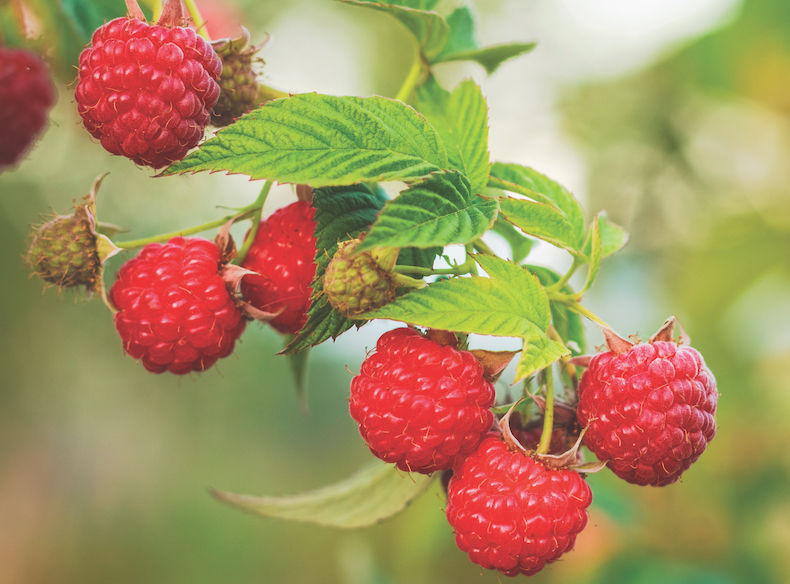
Some floricane varieties need a little maintenance to produce sweet-tasting berries
Image: Thompson & Morgan
Floricanes and primocanes produce crops on different aged stems:
- Primocane varieties produce flowers and fruit on stems grown in the same year. Most Autumn fruiting varieties are primocanes, producing fruit in their first year of growth.
- Floricane raspberries have stems that grow for one year before bearing fruit and flowers, and are usually summer fruiting varieties.
Where to plant raspberries
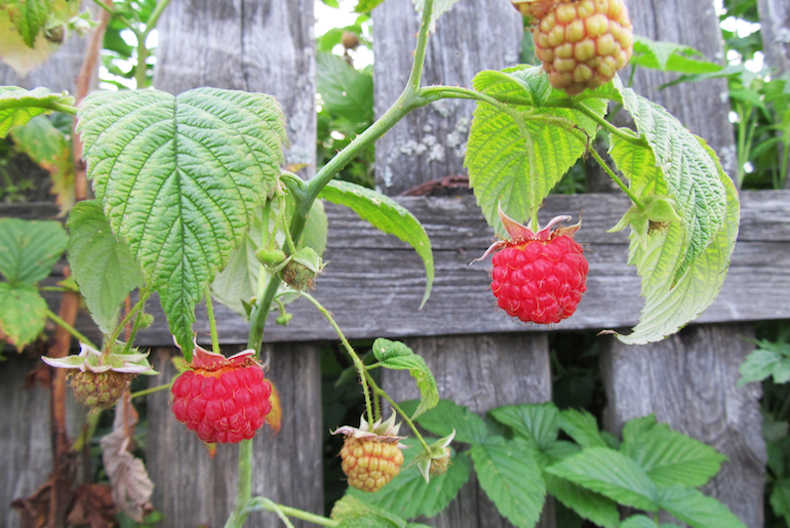
Summer-fruiting raspberries with need support growth for the early stages
Image: LenaXF/Shutterstock
Raspberries like fertile, well drained soil, and though they will tolerate shade, you'll get a much better harvest by planting them in a sunny spot in the garden. Summer-fruiting raspberries need a frame, fence, or wall to support growth to around 1.5m. Autumn-fruiting raspberries are normally fine without support.
How to plant raspberries in the garden
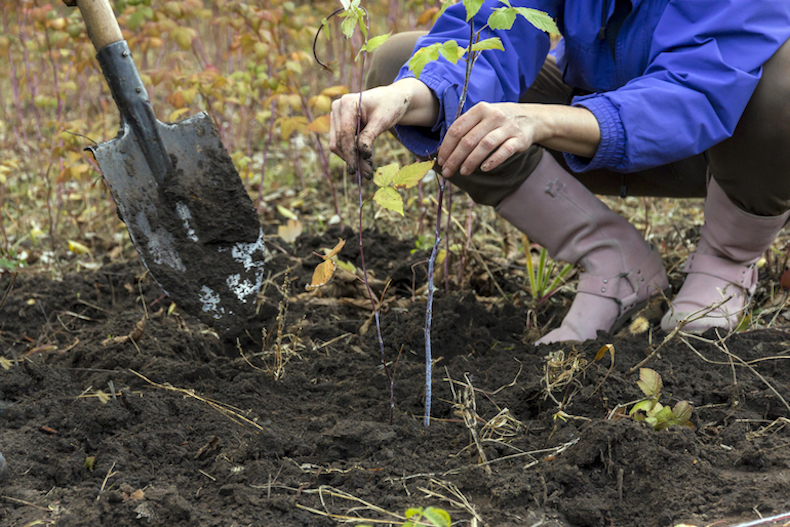
Dependant on what varieties you're growing, the spaces between planting canes will increase in size
Image: Alex Brylov/Shutterstock
Choose a sunny spot and break up the soil with a garden fork before digging in some organic matter – compost (old or new), well rotted manure or recycled green waste are ideal. Here’s how to plant your raspberry canes:
- Knock in a row of posts 1.8m (6ft) high, stretching wires between the uprights, about 60cm (2ft) apart.
- Leave 1.8m (6ft) between rows.
- For summer-fruiting raspberries, plant canes 40 cm apart; for autumn-fruiting varieties plant each cane 60cm apart.
- Plant your canes to a depth of 8cm (3in), gently firm them in, and water well.
- Once planted, cut the canes to 25 cm from the ground to encourage lots of basal shoots.
Growing raspberries in containers
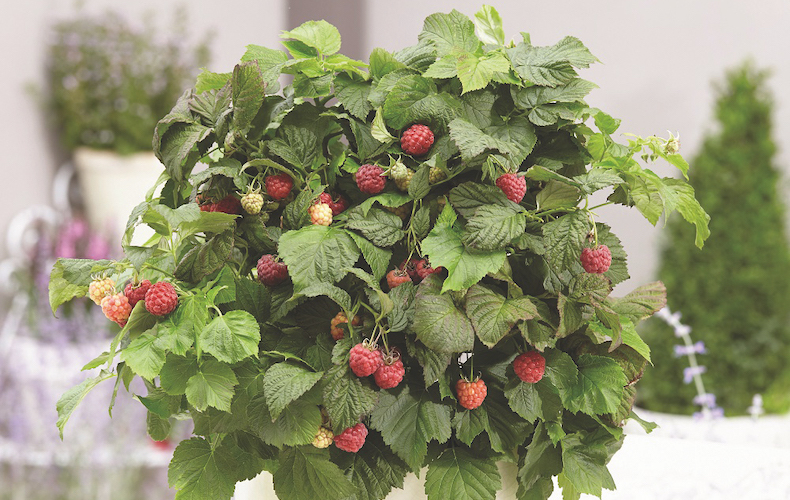
This Raspberry 'Yummy' thrives in containers and fruits from June for summer dishes.
Image: Raspberry 'Yummy' from Thompson & Morgan
As long as you choose a big enough container – about 60cm (24in) diameter – it’s perfectly possible to grow raspberry canes in planters:
- Fill your container with a soil-based compost like John Innes No. 3. This is more stable, and won't dry out as quickly as multi-purpose compost.
- Plant up to six raspberry canes around the perimeter of the container, gently firm them in, and water them.
- Make sure the compost doesn't dry out and feed your raspberries regularly with a high-potash fertiliser throughout the growing season to encourage lots of delicious fruit.
- After three years it's best to plant your container raspberries in the ground.
How to care for raspberry plants
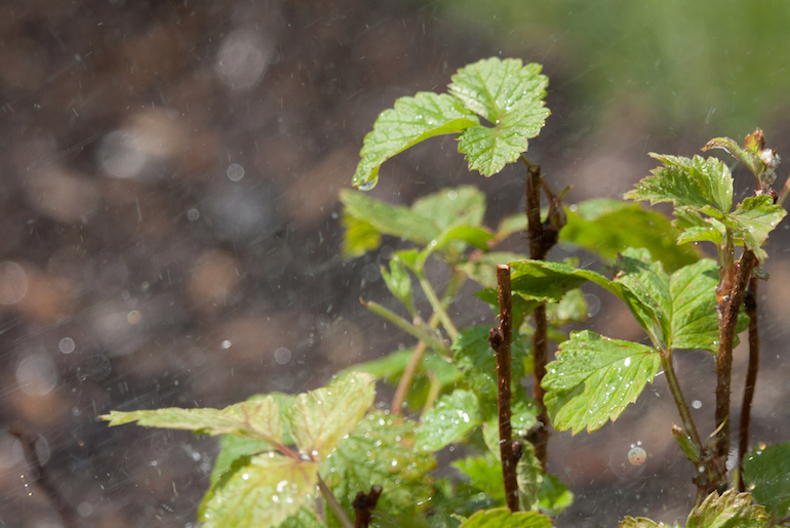
Like with most berries, feeding and watering your raspberry canes will help ensure a good crop.
Image: Ria H/Shutterstock
Taking good care of your raspberries ensures a good crop, and keeps your canes in good condition:
- Feed your raspberries during the spring. Mulch around the canes with well-rotted manure (take care not to bury the canes), or apply a balanced fertiliser and then mulch with compost to help keep the roots moist in dry weather.
- It’s also very important to water raspberry canes during dry weather or your harvest will suffer.
- Raspberries produce 'suckers' along their root system, so new canes may pop up a fair distance from the main plant. Dig up and pull out any that are more than 22cm (9in) from the main row – don’t worry, severing them won't harm the parent plant.
- When the plants start to set fruit it's best to cover them with netting to prevent the birds eating your delicious crop.
Watch the video below to find out more about how to grow and care for your raspberries:
How to prune raspberry canes
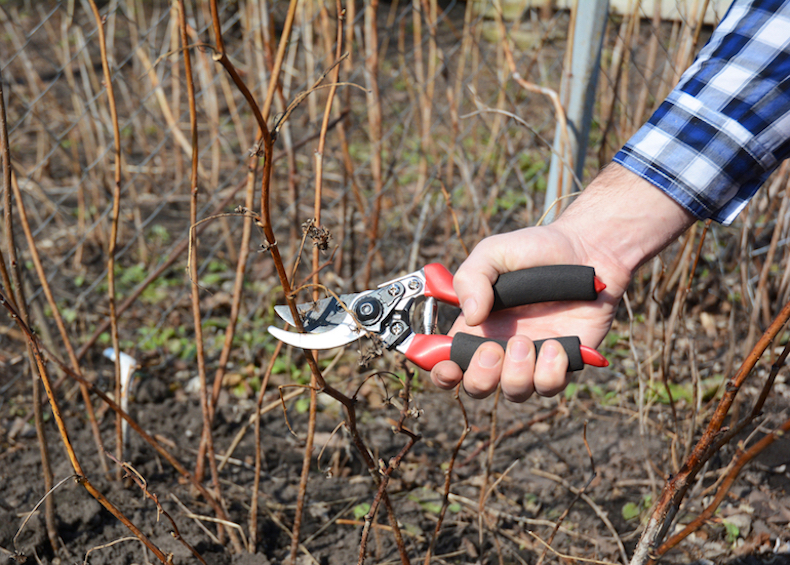
Pruning your raspberry bushes will keep them healthy
Image: Radovan1/Shutterstock
All you need is a pair of secateurs, and some gardening gloves to protect against thorns.
- Autumn-fruiting raspberries. Prune in late winter (February), cutting back all the canes to ground level before new growth commences. The plants will fruit on new growth.
- Summer-fruiting raspberries. During the autumn, cut down to soil level all canes that bore fruit during the summer. It’s worth marking the fruiting canes during the summer so you can distinguish between these and the new season's canes (new season's canes are lush and green). Aim to leave 6-8 of the strongest new canes and remove the rest. The new canes should be spaced 10cm (4in) apart on their support to allow each cane as much light and air as possible.
Learn more about raspberry pruning from the video below
How do you know when to harvest raspberries?
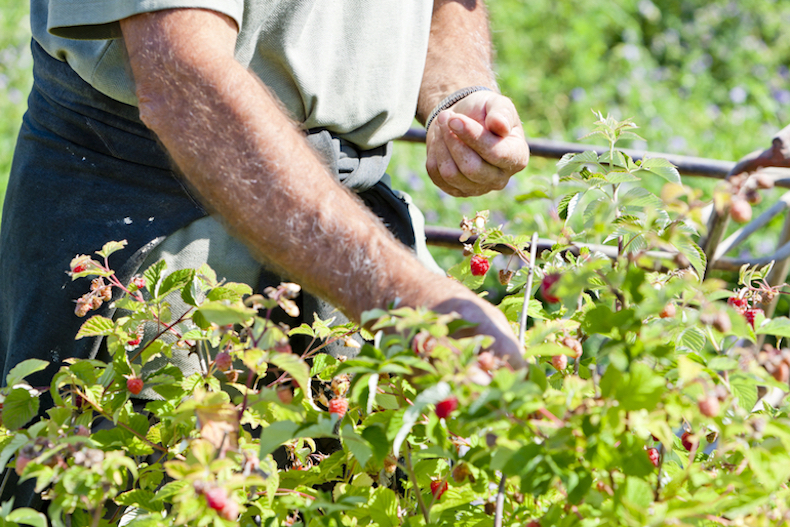
Follow our tips to make sure you don't harvest raspberries too early
Image: Richard Semik/Shutterstock
Your raspberries are ready to harvest when they come off the plant with a gentle tug. Once harvested, they don't keep for long so try freezing some for later. Spread them on a baking tray and put them in the freezer. Once they're frozen, transfer the berries into freezer bags.
Now you know how to grow your own delicious raspberries, try experimenting with the many varieties on offer.
Are you an expert raspberry grower? Share your best tips and tricks with the Thompson & Morgan gardening community over on our Facebook page.
Find plenty of raspberry growing tips and helpful variety reviews at our hub page.
Return to
Other quick links

Written by: Sue Sanderson
Plants and gardens have always been a big part of my life. I can remember helping my Dad to prick out seedlings, even before I could see over the top of the potting bench. As an adult, I trained at Writtle College where I received my degree, BSc. (Hons) Horticulture. After working in a specialist plantsman's nursery, and later, as a consulting arboriculturalist, I joined Thompson & Morgan in 2008. Initially looking after the grounds and coordinating the plant trials, I now support the web team offering horticultural advice online.Sign Up For Exclusive Special Offers




© 2025 Thompson & Morgan. All rights reserved. A division of Branded Garden Products Limited.
Sign up for exclusive offers!



